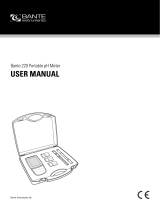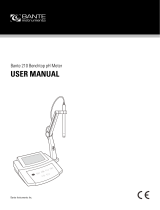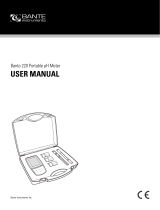Page is loading ...

PHscan30 Pocket pH Tester
USER MANUAL
Bante Instruments Inc.

1 I PHscan30
Overview
Thank you for selecting the PHscan series pocket pH tester. This user
manual provides a step-by-step guide to help you operate the tester,
please carefully read the following instructions before use.
Installing the Batteries
1. Twist the electrode collar counter clockwise, pull the electrode
away from the tester.
2. Insert two AAA alkaline batteries into the battery compartment,
note polarity.
3. Push the electrode into the tester and twist the electrode collar
clockwise until tight.
Keypad
Key
Function
• Switch the tester on or off
• Lock or unlock measurement
• Exit the calibration, settings and return to the pH
measurement
• Start calibration
• Press and hold the key to enter the setup menu
• Select an option
• Confirm the calibration, settings or displayed option
Display
Icon
Description
When the battery voltage falls below the minimum
power requirements, the icon automatically
disappears
MEAS
Indicates that the tester is in the measurement mode
CAL
Indicates that the tester is in the calibration mode
SETUP
Indicates that the tester is in the setup mode
ATC
Indicates that the automatic temperature compensation
is enabled
Prior to Use
Remove the protective cap (and translucent cover) from the bottom of
the tester. If some salt crystals deposited on the electrode, rinse with
tap water to clean these deposits.
If tiny air bubbles are present inside the pH-sensitive glass membrane,
gently shake the tester downward to remove air bubbles.
If the glass membrane has dried out, soak the electrode in 3M KCl or
pH 4.01 buffer solution for about 30 minutes. If above solutions are
not available, use the tap water.
Switching the Tester On and Off
• Press and hold the Meas key for about 5 seconds to switch on
the tester.
• Press and hold the Meas key to switch off the tester.
If you do not press any key within 8 minutes, the tester will switch off
automatically to conserve energy.
3M KCl solution
pH-sensitive
glass membrane

PHscan30 I 2
Setup Menu
The PHscan30 tester contains 7 menu items in the setup menu, the
following table describes the functions of each option.
Menu Item
Option and Description
pH Buffer Group
Set the pH buffer group for calibration and auto-
recognition.
USA (default)
NIST
Calibration Points
Set the number of calibration points.
1 point
2 points (default)
3 points
Measurement Unit
Set the default temperature unit.
Degrees Celsius (default)
Degrees Fahrenheit
Temperature Calibration
Refer to page 4.
Reading ± 10°C
Reading ± 10° F
Auto-Hold
If enabled, the tester will automatically sense and
lock the measurement endpoint.
Enable
Disable (default)
Auto-Power Off
If enabled, the tester will automatically switch off
if no key is pressed within 8 minutes.
Enable (default)
Disable
Factory Reset
If enabled, all of the calibration values and current
settings will be deleted or reset to the factory
defaults, the tester must be recalibrated.
Enable
Disable (default)
Setting the Default Option
1. In the measurement mode, press and hold the Cal key to enter
the setup menu.
2. If necessary, press the Cal key again to select an option.
3. Press the Enter key, the tester saves the current option and moves
to the next menu item.
4. Repeat steps above until the tester returns to the measurement
mode.
• During the setting process, if you do not need to calibrate the
temperature, press the Enter key to skip the / or /
option.
• To exit the setup menu, press the Meas key.
pH Calibration
The PHscan30 tester allows 1 to 3 points calibration, we recommend
that you perform at least 2 points calibration for accurate pH
measurement, the tester will automatically recognize and calibrate to
following standard buffer values.
USA standard buffers
pH 4.01, 7.00, 10.01
NIST standard buffers
pH 4.01, 6.86, 9.18
Single point calibration should only be carried out with the pH 7.00
or 6.86, otherwise calibration will not be accepted.
Option
Menu item

3 I PHscan30
For better accuracy, we recommend calibrating the tester regularly.
DO NOT reuse the buffer solutions after calibration, contaminants in.
solution will affect the calibration and eventually the accuracy of the.
measurement.
Single Point Calibration
Ensure that you have selected 1 point calibration in the setup menu.
1.1 Press the Cal key, the tester shows pH 7.00/CAL 1.
1.2 Rinse the electrode with distilled water, place the electrode into
the pH 7.00 buffer solution, stir the tester gently to create a
homogeneous solution.
1.3 Press the Enter key, the tester begins the calibration. When the
reading has stabilized, the display will show . Calibration
is completed.
2 Points Calibration
Ensure that you have selected 2 points calibration in the setup menu.
2.1 Repeat steps 1.1 through 1.3 above. When the first calibration
point is completed, the display will show ---- / CAL 2, the tester
prompts you to continue with second point calibration.
2.2 Rinse the electrode with distilled water, place the electrode into
pH 4.01 or 10.01 buffer solution, stir the tester gently.
2.3 Press the Enter key, the tester automatically recognizes the buffer
solution and begins calibration. When the reading has stabilized,
the display automatically shows the electrode slope (e.g., 99%)
and . Second point calibration is completed.
3 Points Calibration
Ensure that you have selected 3 points calibration in the setup menu.
3.1 Repeat steps 1.1 through 1.3 above. When the first calibration
point is completed, the display will show pH 4.01/CAL 2, the
tester prompts you to continue with second point calibration.
3.2 Rinse the electrode with distilled water and place into the pH
4.01 buffer solution, stir the tester gently. Press the Enter key,
the tester begins calibration. When the reading has stabilized,
the display will automatically show the electrode slope and pH
10.01/CAL 3.
3.3 Rinse the electrode with distilled water and place into the pH
10.01 buffer solution, stir the tester gently. Press the Enter key.
When the reading has stabilized, the display will automatically
shows the electrode slope and . Calibration is completed.
• During the calibration, if the display shows indicating that
the measured mV value for the current calibration point deviates
by more than 60 mV ( approximately ± 1 pH ) from the theoretical
value of the pH buffer. The calibration will not be accepted.
Please check the electrode and make sure the buffer solutions
are fresh and uncontaminated.
• To exit the calibration without saving calibrated values, press
the Meas key.

PHscan30 I 4
Temperature Calibration
The PHscan30 tester is installed with a built-in temperature sensor
for automatic temperature compensation. During the measurement,
if the measured temperature reading differs from that of an accurate
thermometer, the tester needs to be calibrated.
1. Press and hold the Cal key to enter the setup menu.
2. Press the Enter key until the display shows / or / .
3. Press the Cal key, the tester enters the temperature calibration
mode.
4. Place the electrode into a solution with a known accurate
temperature and wait for the measurement to stabilize.
5. Press the Cal key to modify the temperature value.
6. Press the Enter key to save and press the Meas key to return
to the measurement mode.
Measurement
Rinse the electrode with distilled water, place the electrode into the
sample solution and stir gently. Note, DO NOT completely immerse
the tester in water. Wait for the measurement to stabilize and record
the reading.
If your tester installed a spear tip electrode or flat surface electrode
(refer to the Optional Accessories > pH Electrodes section) and the
samples are soft solid or semi-solid, wet the sample with clean water,
then slight pressure the electrode to take measure. Note that the pH-
sensitive membrane must be fully touched with sample surface.
• During the measurement, never wipe the pH-sensitive membrane
as this will cause static interference, blot dry with a lint-free
tissue to remove waterdrops on electrode.
• If the display shows ---- indicating the measurement exceeds
the range, remove the tester from the sample immediately.
• If the option is enabled in the setup menu, the tester will
automatically lock the measurement endpoint and show HOLD
icon. Press the Meas key to resume measuring.

Appendix
Preparation of pH Buffer Solutions
The PHscan30 tester is packaged with the pH 4.01/7.00/10.01 buffer
sachets required for calibration.
1. Half fill a 250 ml volumetric flask with distilled water and add the
pH 7.00 buffer reagent.
2. Swirl the volumetric flask gently to dissolve the reagent and fill
to the mark with distilled water.
3. Cap and upend the volumetric flask several times to mix solution.
• Preparation of pH 4.01 and 10.01 buffer solutions are the same
as above.
• Prepared buffer solution should be stored in hermetically sealed
glass container and avoid direct sunlight.
Preparation of Electrode Storage Solution
Dissolve 24.6 grams of analytical grade KCl reagent in 100 ml distilled
water. Add pH 4.01 standard buffer and adjust solution to pH 4.
Optional Accessories
Solutions
Order Code
Description
PHCS-USA
pH 4.01, 7.00, 10.01 buffer solutions, 480 ml
PHCS-ES
Electrode storage solution, 480 ml
PHCS-OG
Electrode cleaning solution, removes oil and
grease contaminants, 480 ml
PHCS-PR
Electrode cleaning solution, removes protein
contamination, 480 ml
5 I PHscan30
250 ml
Electrode
Maintenance and Replacement
Cleaning the Electrode
• Since the pH-sensitive membrane is susceptible to contamination,
make sure that rinse the electrode thoroughly with distilled water
after use.
• If your sample contains the oil or grease, soak the electrode in mild
detergent or electrode cleaning solution for at least 15 minutes,
then rinse with distilled water.
• If you do not use the tester for a period longer than 1 month, store
the electrode in 3M KCl solution or electrode storage solution.
DO NOT store the electrode in distilled or deionized water, which
will deplete the hydration layer of the pH-sensitive membrane and
render the electrode useless.
Replacing the Electrode
If the tester fails to calibrate or gives fluctuating readings, you should
consider replacing the electrode.
1. Twist the electrode collar counter clockwise, pull the electrode
away from the tester.
2. Align the slot on the new electrode, gently push the electrode
into the tester.
3. Twist the electrode collar clockwise until tight.

PHscan30 I 6
pH Electrodes
Order Code and Description
E-PHscan-ST-10K
• Circular pH-sensitive membrane
• For measuring the general water samples
(non-viscous, non-corrosive liquids)
E-PHscan-FT-10K
• Flat surface pH-sensitive membrane
• For measuring surfaces of semi-solid or gel
samples, e.g., cream, paper, cloth, bread
dough, skin, etc.
E-PHscan-LT-10K
• Flat surface pH-sensitive membrane
• Electrode dimensions: 75 × 13.5 (Dia.) mm
• For measuring the small volume samples,
e.g., sample in the test tube
E-PHscan-PT-10K
• Spear tip pH-sensitive membrane.
• For piercing and measuring the semi-solid
samples, e.g., soil, meat, cheese, etc.
Tester Specifications
Model
PHscan30
pH
Range
-1.00 to 15.00 pH
Resolution
0.01 pH
Accuracy
± 0.01 pH
Calibration Point
1 to 3 points
pH Buffer Option
USA or NIST
Automatic Buffer
Recognition
pH 4.01, 7.00, 10.01 or 4.01, 6.86, 9.18
Temperature
Compensation
0 to 60° C (32 to 140° F), automatic
Temperature
Range
0 to 60° C (32 to 140° F)
Resolution
0.1° C (0.1° F)
Accuracy
± 1° C (± 1.8° F)
Calibration Point
1 point
Calibration Range
Reading ± 10° C/°F
Other Specifications
Operating Temperature
0 to 50° C (32 to 122° F)
Storage Temperature
0 to 60° C (32 to 140° F)
Relative Humidity
< 80% (non-condensing)
IP Rating
IP54
Display
LCD, 21 × 21 mm (0.82 × 0.82 in.)
Power Requirements
2 × 1.5V AAA alkaline batteries
Auto-Off
8 minutes after last key pressed
Dimensions
185 (L) × 40 (Dia.) mm (7.28 × 1.57 in.)
Weight
100 g (3.5 oz.)

The information in this document is subject to change without notice.
Copyright © Bante Instruments Inc, 2022. All rights reserved.
Disposal
This product is required to comply with the European Union’s Waste
Electrical and Electronic Equipment (WEEE) Directive 2002/96/EC and
may not be disposed of in domestic waste. Please dispose of product
in accordance with local regulations at the collecting point specified
for electrical and electronic equipment.
Warranty
The warranty period for tester is one year from the date of shipment.
Above warranty does not cover the electrode and pH buffer solutions.
Out of warranty products will be repaired on a charged basis.
The warranty on your tester shall not apply to defects resulting from:
• Improper or inadequate maintenance by customer
• Unauthorized modification or misuse
• Operation outside of the environment specifications of the
products.
For more information, please contact the supplier.
Office: 4715 Castlewood St., Sugar land, TX 77479, USA
Tel: (+1) 346-762-7358
E-mail: banteinstruments@yahoo.com
Factory: F3, Building 2, No.2185, Laifang Rd., Shanghai 201615, China
Tel: (+86) 21-6404-1598
E-mail: banteinstrument@hotmail.com
www.bante-china.com
/








